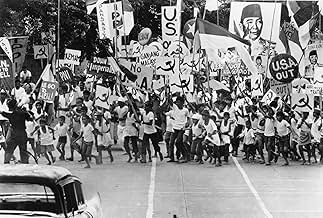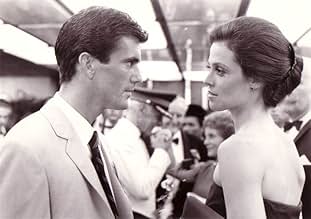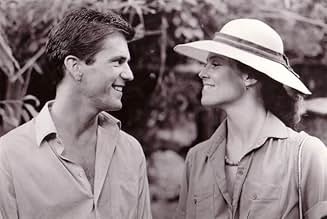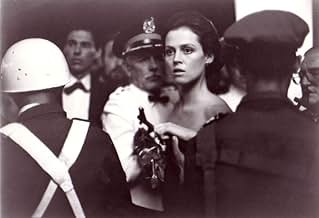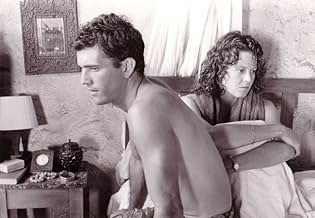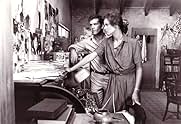IMDb RATING
7.1/10
24K
YOUR RATING
A young Australian reporter tries to navigate the political turmoil of Indonesia during the rule of President Sukarno with the help of a diminutive photographer.A young Australian reporter tries to navigate the political turmoil of Indonesia during the rule of President Sukarno with the help of a diminutive photographer.A young Australian reporter tries to navigate the political turmoil of Indonesia during the rule of President Sukarno with the help of a diminutive photographer.
- Won 1 Oscar
- 10 wins & 14 nominations total
Featured reviews
It's 1965 Jakarta in Indonesia under the brutal rule of President Sukarno. Guy Hamilton (Mel Gibson) is on his first foreign assignment for the Australian Broadcasting Service. He is befriended by photographer half-Chinese dwarf Billy Kwan (Linda Hunt). There is an air of anti-western feeling. Guy is lost without connections until Billy starts helping him out. He has an affair with British diplomat Jill Bryant (Sigourney Weaver). It's a world of murky Cold War politics, secrets and trying morality.
This has a great exotic atmosphere. The movie has a sense of impending doom. Mel Gibson is terrific and shows his superior star power. Linda Hunt creates such a compelling character. It does need to heighten the tension a little. The plot meanders in this murky world. It needs a direction. Nevertheless I just love the dark exotic mood.
This has a great exotic atmosphere. The movie has a sense of impending doom. Mel Gibson is terrific and shows his superior star power. Linda Hunt creates such a compelling character. It does need to heighten the tension a little. The plot meanders in this murky world. It needs a direction. Nevertheless I just love the dark exotic mood.
She is the main ingredient of the impecable bitter beauty of the film. The second - the music. And the oniric air. It is not the only political, war , romantic film . And , maybe, other are better than it. But the craft is so high, the chemistry between Sigourney Weaver and Mel Gibson works so well, Linda Hunt gives a so magnificent performance than this film becomes at its end not memorable but a precious gift. So, just admirable. And one of the most powerful performances in a war film.
I am a little amazed that, so far, only 40 comments have been entered. Fortunately most are of high quality, and all the important points related to the film are clearly highlighted. So, I will not repeat what has been well said by others. I want to explain one additional point, it has to do with my personal experience but might be interesting to mention.
I'm a professional expatriate, living overseas for 25 years. I'm not talking about an American in Paris or an Englishman in New York, I mean African steppes, tropical jungles, Indian slums. Living in a totally foreign country, in a totally strange culture, imperfectly understanding the local language, bewildered by alien logic, you experience a permanent sense of unease. You adapt, you learn to cope, you make what you hope are friends. But you never forget that you are a stranger in unknown territory, and that you are vulnerable.
You may peacefully walk on the street one minute, the next minute bullets are flying all around you. In the evening you have a pleasant drink with your neighbour, in the morning you are arrested, accused of being a foreign mercenary. When you travel inland you come at a road block, not knowing if they'll let you pass, or harass you for a couple of hours, or confiscate your car. As a foreigner in developing countries, you are constantly confronted with uncertainty, an intangible menace lurking around the corner.
I find that TYOLD transmits this sense of menace very poignantly. Many people have commented on its brilliant sense of place, the accurate depiction of Indonesia and the events that took place at the time. Others mention that you get a very real feeling of the tension and uncertainty journalists in times of upheaval are subjected to. But I would like to extend it beyond journalists. The sense of menace in TYOLD is eminently recognizable by all who have lived in countries where the police is not there to protect you, the laws are not there to make society more civilized, the hospitals are not there to cure you. In TYOLD, the menace is made visible because of the troubles that erupt, but usually you do not have to live through civil war when overseas. Still, the menace is not less real, and the sense of foreboding haunting every expatriate was very convincingly conveyed in the film.
I'm a professional expatriate, living overseas for 25 years. I'm not talking about an American in Paris or an Englishman in New York, I mean African steppes, tropical jungles, Indian slums. Living in a totally foreign country, in a totally strange culture, imperfectly understanding the local language, bewildered by alien logic, you experience a permanent sense of unease. You adapt, you learn to cope, you make what you hope are friends. But you never forget that you are a stranger in unknown territory, and that you are vulnerable.
You may peacefully walk on the street one minute, the next minute bullets are flying all around you. In the evening you have a pleasant drink with your neighbour, in the morning you are arrested, accused of being a foreign mercenary. When you travel inland you come at a road block, not knowing if they'll let you pass, or harass you for a couple of hours, or confiscate your car. As a foreigner in developing countries, you are constantly confronted with uncertainty, an intangible menace lurking around the corner.
I find that TYOLD transmits this sense of menace very poignantly. Many people have commented on its brilliant sense of place, the accurate depiction of Indonesia and the events that took place at the time. Others mention that you get a very real feeling of the tension and uncertainty journalists in times of upheaval are subjected to. But I would like to extend it beyond journalists. The sense of menace in TYOLD is eminently recognizable by all who have lived in countries where the police is not there to protect you, the laws are not there to make society more civilized, the hospitals are not there to cure you. In TYOLD, the menace is made visible because of the troubles that erupt, but usually you do not have to live through civil war when overseas. Still, the menace is not less real, and the sense of foreboding haunting every expatriate was very convincingly conveyed in the film.
15 years after its release, I finally get to see what to my knowledge is the only english-speaking film that tells the story of Indonesia circa the 1965 revolution.
A very young Gibson is convincing as the inexperienced but ambitious reported determined to make his mark in telling the story of Sukarno's last moments in power. Equally brilliant is Sigourney Weaver, and yet one feels that this film did not give her the opportunity to show her true calibre.
The one who ultimately steals the show, then, is Linda Hunt, playing the enigmatic and passionate Billy, who understands the true psyche of Indonesia better than any of the other foreign characters in this story.
When Billy solemnly expresses his disappointment to Guy, proclaiming, "I created you", it evoked images of Weir's latest masterpiece, The Truman Show, where Christof has fashioned the persona of Truman Burbank for his TV spectacle. Perhaps a running theme in Peter Weir's work? Must check out...
I marvelled at the authenticity of the setting. It certainly looked like Jakarta. The faces, the atmosphere, the buildings, and yet, those scenes were shot in the Philippines, with mainly Filipino actors! Just goes to show the similarity among Indonesia and the Philippines.
I see now why this film was never made available in Indonesia (to my knowledge). The last few moments of the film show the stark reality of communist executions by Soeharto's new military regime, horrifying pictures of mere pawns being slaughtered... and the parting message from a self-confessed PKI member:"Am I stupid for wanting to change my country's condition?" is one of the best lines in this film.
A very young Gibson is convincing as the inexperienced but ambitious reported determined to make his mark in telling the story of Sukarno's last moments in power. Equally brilliant is Sigourney Weaver, and yet one feels that this film did not give her the opportunity to show her true calibre.
The one who ultimately steals the show, then, is Linda Hunt, playing the enigmatic and passionate Billy, who understands the true psyche of Indonesia better than any of the other foreign characters in this story.
When Billy solemnly expresses his disappointment to Guy, proclaiming, "I created you", it evoked images of Weir's latest masterpiece, The Truman Show, where Christof has fashioned the persona of Truman Burbank for his TV spectacle. Perhaps a running theme in Peter Weir's work? Must check out...
I marvelled at the authenticity of the setting. It certainly looked like Jakarta. The faces, the atmosphere, the buildings, and yet, those scenes were shot in the Philippines, with mainly Filipino actors! Just goes to show the similarity among Indonesia and the Philippines.
I see now why this film was never made available in Indonesia (to my knowledge). The last few moments of the film show the stark reality of communist executions by Soeharto's new military regime, horrifying pictures of mere pawns being slaughtered... and the parting message from a self-confessed PKI member:"Am I stupid for wanting to change my country's condition?" is one of the best lines in this film.
In "The Year of Living Dangerously" director Peter Weir attempts much and accomplishes most of his goals. It's a socio-political essay on the dangers of Western meddling in Third World countries. It's a fascinating view into the challenges of journalism in a volatile foreign country. It's a steamy romance involving two beautiful, intelligent characters. It's a distinctly Far Eastern morality play that seems to delight in yin/yang paradoxes. Plus it's one of the best films at evoking the mood, texture, and sensuality of life in Southeast Asia. Don't be too harsh on Weir for the lapses in historic accuracy and plotting, because it's a complicated, busy landscape he is painting here. The best things about the film are:
-Linda Hunt's amazing performance. Unlike other gender-bending performances (Julie Andrews in "Victor/Victoria", Dustin Hoffman in "Tootsie") you never once give any thought to the fact that this is a woman playing a man. It's a seamless transition and a performance of immense heart and honesty. The image of a distraught Billy pounding at his typewriter, pleading "What then must we do?" while an aria swells around him and the eyes of Jakarta's poor stare at him from his own photographs, is an incredibly moving scene.
-The atmosphere created by the combination of Russell Boyd's cinematography and Maurice Jarre's score. Take a look at the scene with Weaver walking through the streets of Jakarta in a tropical downpour. The effect is breathtaking.
-The chemistry between Gibson and Weaver. You can feel the heat between them. Unlike other posters here, I believe their romance is one of the film's strong points.
I agree that the ending is a bit of a letdown, but it doesn't diminish Weir's accomplishments. "The Year of Living Dangerously" is a startling unique film, and certainly one his best.
-Linda Hunt's amazing performance. Unlike other gender-bending performances (Julie Andrews in "Victor/Victoria", Dustin Hoffman in "Tootsie") you never once give any thought to the fact that this is a woman playing a man. It's a seamless transition and a performance of immense heart and honesty. The image of a distraught Billy pounding at his typewriter, pleading "What then must we do?" while an aria swells around him and the eyes of Jakarta's poor stare at him from his own photographs, is an incredibly moving scene.
-The atmosphere created by the combination of Russell Boyd's cinematography and Maurice Jarre's score. Take a look at the scene with Weaver walking through the streets of Jakarta in a tropical downpour. The effect is breathtaking.
-The chemistry between Gibson and Weaver. You can feel the heat between them. Unlike other posters here, I believe their romance is one of the film's strong points.
I agree that the ending is a bit of a letdown, but it doesn't diminish Weir's accomplishments. "The Year of Living Dangerously" is a startling unique film, and certainly one his best.
Did you know
- TriviaDirector Peter Weir cast Linda Hunt in the role of Billy Kwan after failing to find an actor who could play the part the way he wanted.
- GoofsBilly's still camera is a Nikon F2 Photomic, which was not released until 1971, while the film takes place in 1965.
- Quotes
Billy Kwan: What then must we do? We must give with love to whoever God has placed in our path.
- ConnectionsFeatured in Peter Weir Industry Seminar 1989 (1989)
- SoundtracksBeim Schlafengehen
from "Four Last Songs"
by Richard Strauss
Performed by Kiri Te Kanawa and London Symphony Orchestra
Conducted by Andrew Davis
Courtesy of CBS Masterworks
Published by Boosey-Hawkes
Details
- Release date
- Countries of origin
- Languages
- Also known as
- El año que vivimos en peligro
- Filming locations
- Production companies
- See more company credits at IMDbPro
Box office
- Budget
- $13,000,000 (estimated)
- Gross US & Canada
- $10,278,575
- Opening weekend US & Canada
- $35,000
- Jan 23, 1983
- Gross worldwide
- $10,278,575
Contribute to this page
Suggest an edit or add missing content

